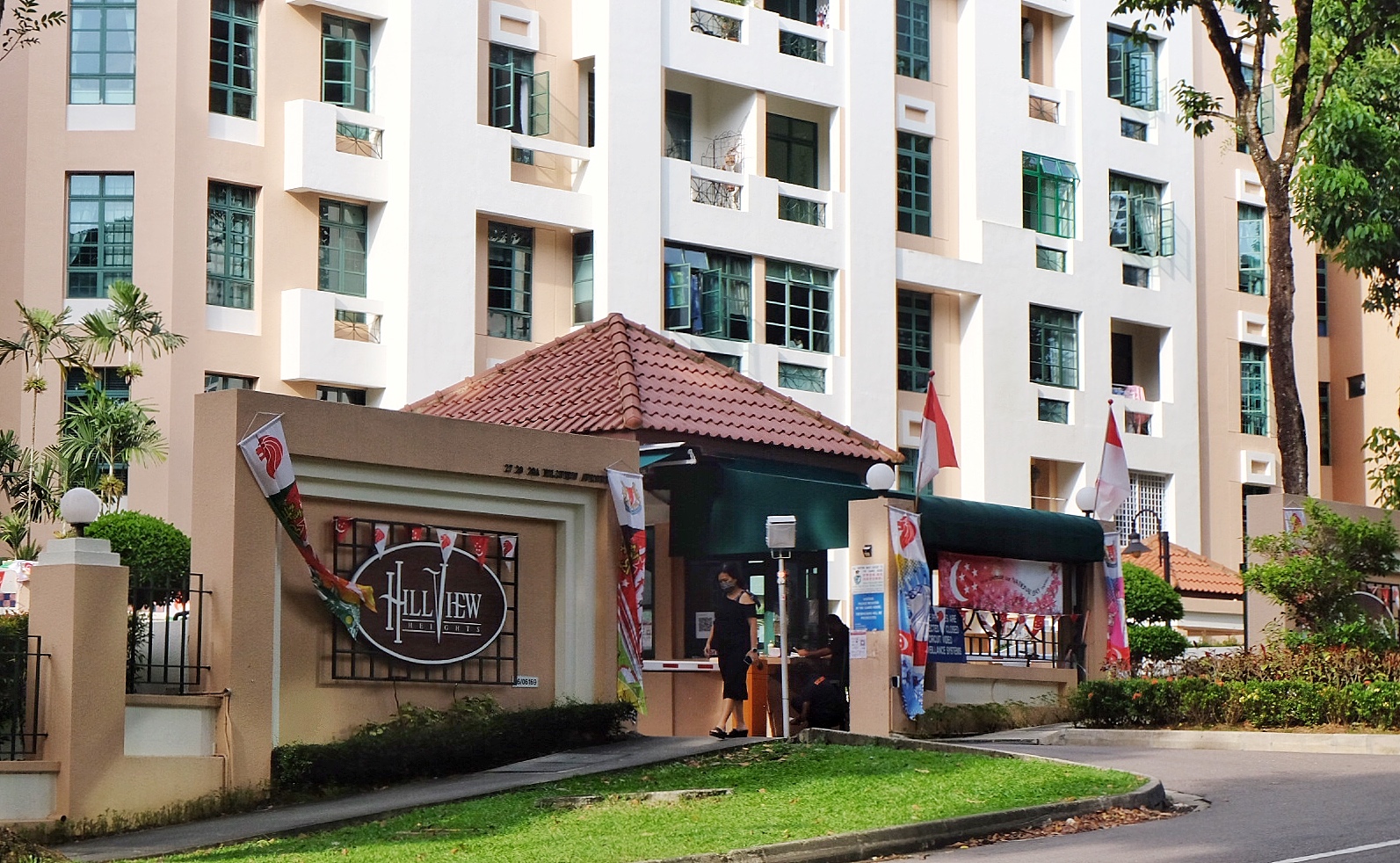Hillview Heights condo management flagged by security association for discriminatory hiring practices
Sign up now: Get ST's newsletters delivered to your inbox

A tender by Savills Property Management stipulated that a security agency must provide a "Chinese-speaking" security guard for more than six shifts each month.
ST PHOTO: KHALID BABA
SINGAPORE - The managing agent of Hillview Heights condominium has been flagged by the Security Association Singapore for discrimination against non-Mandarin speakers and older workers in its tender for security services.
In a Facebook post and statement to the press on Monday (Sept 6), the association highlighted clauses of the tender by Savills Property Management, which stipulate that a security agency must provide a "Chinese-speaking" security guard for more than six shifts each month, with those who speak dialect acceptable.
Penalties for not complying include a warning letter and deduction of $100 per shift.
The security agency could also be fined $100 if the guard provided is not within the age range of 21 to 60 years old.
The tender, which lasts a year, from Nov 1 to Oct 31 next year, closed last Friday.
The security association said that while there were other clauses that were of concern, it shared these particular ones "because they appear to penalise security agencies unless they exercise discrimination in their hiring and deployment of security officers".
The statement said Mandarin and dialects are not the same, "so what exactly is the job requirement here that Savills is looking for?"
It added: "Furthermore, for a Singapore condominium, is it a reasonable requirement for a Chinese-speaking officer to be deployed at all times? It appears that the intention is for an ethnically Chinese officer to be deployed on a frequent basis at the condominium. This would be race discrimination."
As for the limits on age, the association pointed out that there is nothing in the tender document that indicates the basis on which the management would give or withhold its approval to deploy a guard to the condominium located off Upper Bukit Timah Road.
"It appears there is just an intention for older workers not to be deployed at the site," it said.
In response to queries from The Straits Times, a spokesman for Savills said: "This is an unfortunate situation created by historical tender documentation language from 2000. We sincerely apologise for any confusion caused and have taken steps to ensure all tender documentation reflects current Tripartite Guidelines on Fair Employment Practices."
The company added that it has been "invited by the Singapore Police Force to introduce outcome-based contracts and will be reviewing the terms and conditions for our clients' approval".
Outcome-based contracts focus on expected outputs and outcomes rather than manpower needs. They are unlike traditional, manpower-based contracts for security agencies, where a fixed number of security personnel are deployed.
Savills also welcomed dialogue between the Security Association Singapore and the Association of Strata Managers "to ensure we are all aligned in the future".
The security association said it would raise the matter with the Tripartite Alliance for Fair and Progressive Employment Practices (Tafep), as well as the Ministry of Manpower.
It also highlighted a "gap in the law", where "managing agents like Savills and service buyers like Hillview Heights may be able to get away with forcing service providers like security agencies to carry out discriminatory practices".
The association said it had raised this issue with the MOM last year and urged that its guidelines on fair employment be extended to buyers of outsourced services as well. Currently, the guidelines apply only to employers.
It also responded to Savills' statement, saying: "We are encouraged that Savills is actively taking steps to address this issue and to advise their clients accordingly.
"It is timely that Savills is now reviewing the wording of its contracts from 2000. We will also be happy to engage Savills in constructive dialogue to address this problem and to assist them to craft fair security contracts."
The association's executive director, Mr Ikhsan Suri, said in its press statement that managing agents should "properly advise their clients, the service buyers, on how to fairly, legally and correctly outsource manpower services".
"Instead, we have seen that some managing agents encourage and empower buyers to be discriminatory. This is especially disappointing, given that many outsourced service workers are in low-wage professions and should not see any opportunities slip by them due to workplace discrimination," he said.
"Security Association Singapore will continue to keep a lookout for unfair clauses in tenders and contracts, and highlight them as needed," he added.
Labour MP Desmond Choo and Mr Steve Tan, executive secretary of the Union of Security Employees (USE), agreed that requirements for specific race or age are discriminatory.
"Hiring should always be based on competency but as a system, we are not there yet," said Mr Choo. "Most infringements are poor human resources practices to be remedied, but there are egregious practices that must be dealt with firmly."
He said the Hillview Heights condominium incident is "an example of why we need an enhanced workplace fairness framework to deal with archaic and misguided practices".
"It allows companies to improve while still allowing firm laws to deal with the most egregious of cases."
Referring to a "copy paste job" of outdated tender documentation, as in the case of Savills for Hillview Heights, Mr Tan of the USE said "past practices are not the best way to guide buyers".
He said buyers, or managing agents, should assess their security needs, install the necessary technology and then hire manpower to leverage on the technology.
During the National Day Rally last month, Prime Minister Lee Hsien Loong said that Singapore will not tolerate discrimination at workplaces.
Along with enshrining Tafep's guidelines into law, he announced the creation of a tribunal to protect workers against workplace discrimination based on nationality, age, race, religion and disability, as well as other discriminatory practices covered by the tripartite alliance.


